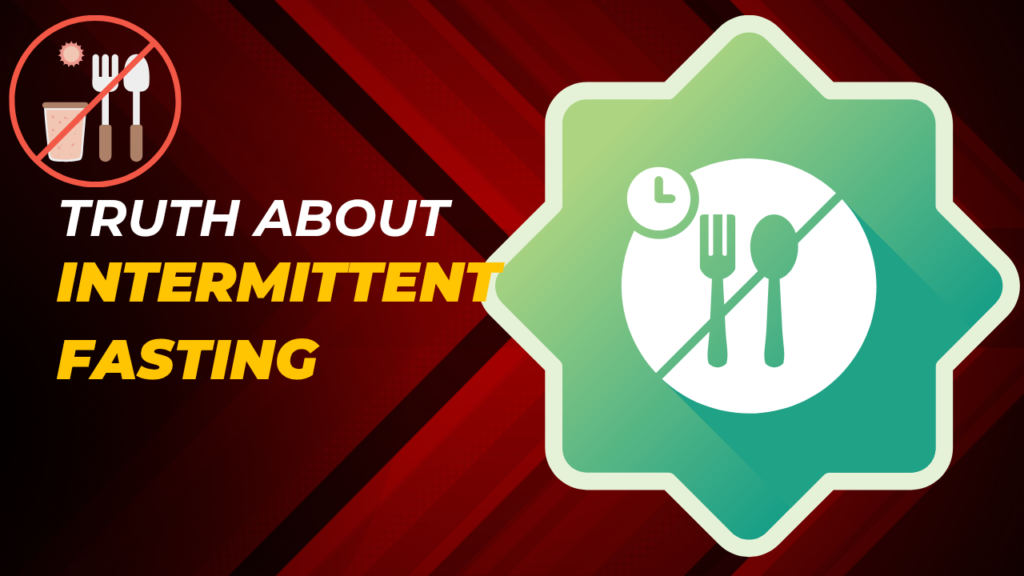
Introduction:
Intermittent fasting has become a popular trend in the health and Wellness space. It is often called a miracle solution for weight loss. But is it really magic or just a myth? In this guide today I will help you to uncover the truth behind intermittent fasting for the body and impact on weight loss.
So let’s look at what intermittent fasting means and is it a sustainable approach for you or not.
What is intermittent fasting?
Intimated fasting is not a diet but an eating pattern. It cycles between fasting and eating. When we talk about the traditional diets it actually focuses on what to eat. But when we discuss intermittent fasting for weight loss it focuses on when to eat.
Let us discuss rules of intermittent fasting a bit more –
16/8 intermittent fasting – In this method fasting is done for around 16 hours and eating should be within an 8 hour window.
5:2 diet – Eating normally for 5 days and reducing the calorie intake for two days. It will help to shed around 500 to 600 calories.
Alternate day fasting – Alternating between normal eating and fasting days.
One day A meal intermittent fasting – In this approach consuming all the daily calories in one meal and fasting for the rest of the day.
How does intermittent fasting help to reduce weight?
First intermittent fasting reduces the calorie intake by reducing the number of hours available for eating. This way it leads to weight loss overtime.
It also improves insulin sensitivity by helping the body to access the Stored fat more effectively.
It increases fast fat burning because the body deplete glycogen which is stored and start burning it for energy.
Studies have shown that it enhances metabolism by increasing norepinephrine levels which leads to increased calorie burning. It increases and triggers the production of autophagy which is the process where the body removes damaged cells and helps to regenerate.
Fasting not only helps to reduce weight but also reduces inflammation and improves brain functioning.
How intermittent fasting benefits both body and mind?
Intermittent fasting is not just about losing your extra weight. It is also about enhancing your overall well being by improving physical and mental health simultaneously.
Some of the physical benefits include – Intermittent fasting helps to reduce blood pressure, body cholesterol , LDL, inflammation,and heart disease.
It gives the digestive system a break to allow the gut microbiome to balance. So thereby reducing bloating and improving digestion. This fasting reduces oxidative stress and inflammation, and supports a more resilient immune system.
It enhances lifespan by promoting cell repair and reducing the risk of age related disease.
Mental and cognitive benefits of intermittent fasting –
- 1. It helps to regulate cortisol levels and thus reduce stress and anxiety.
- 2. It prevents mood swings and irritability.
- 3. It increases the production of brain derived neurotrophic factors that have to support memory focus and cognitive performance. Because it helps with circadian rhythms it leads to a deep and restful sleep.
- 4. It reduces neurodegenerative diseases and protects against Alzheimer and Parkinson’s disease.
Myths about Intermittent fasting -:
Intermittent fasting is not a one size fit or solution. While it offers some promising benefits to the body it also requires discipline and adaptation to it. Let us know the truth or some myths around it –
1. It is said that beyond 72 hours prolonged fasting slows down your metabolism. Short term fasting actually boosts metabolism but long hours can actually make it more unstable. As it has been practised in various cultures. It has both scientific, religious and health reasons associated with it. So to support the intermittent fasting benefit it is just a passing new trend for weight loss.
Is intermittent fasting right for you or not?
People struggling with weight loss can definitely help to share some extra Pounds with the help of intermittent fasting.
Individuals with insulin resistance or pre diabetes can effectively take advantage of it. Those looking for an easy and flexible dietary approach in intermittent fasting towards weight loss can consider it as a good choice. Anyone who is seeking to improve metabolic health should definitely go with intermittent fasting.
Who can avoid it?
Pregnant or breastfeeding women should definitely avoid it.
Those individuals who have a history of eating disorders should consult a doctor before engaging in it.
And those with chronic medical conditions can also consult a doctor before starting.
Conclusion:
If you find that it suits your lifestyle effectively you can definitely follow it for long term health and wellness goals.
Combine it with a balanced diet, regular exercise, and mindful eating habits. And if done correctly, intermittent fasting weight loss method can be one of the most sustainable methods for weight loss, mental clarity and overall health improvement.